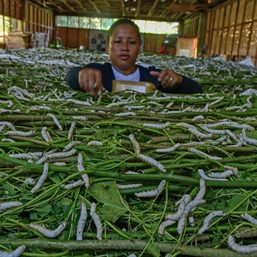SUMMARY
This is AI generated summarization, which may have errors. For context, always refer to the full article.

CEBU, Philippines – Rosechyel Leceña, 34, a native of Sitio Maharlika in Barangay Tipolo, Mandaue City, has been living at the Cebu International Convention Center (CICC) since her home was destroyed in a fire in 2019.
On June 6, the Mandaue City government’s Housing and Urban Development Office (HUDO) issued a notice of demolition to residents, informing them that they had 15 days to demolish their structures and leave the CICC.
Leceña, who makes a living selling barbecue, shared her distress over the looming demolition and where she and other residents would go.
“Naglisod man gali mi og pangita sa among kadaadlaw nga kaunon kay tungod mag sige og ulan-ulan dili baya jud ko ka tinda…Unsaon na lang namo pagigo sa among income nga makaabang gyud mi” Leceña told Rappler on Tuesday, June 25.
(We are already struggling to make ends meet because if it rains, I can’t sell…How are we supposed to make ends meet if we still have to pay rent)
At present, the HUDO is rolling out a housing initiative to provide homes for fire victims who have stayed at CICC for more than five years.
HUDO Head Karlo Cabahug told Rappler on Monday, June 24, that residents would be transferred to the city’s mid-rise building (MRB) socialized housing project. He also clarified that the notice of demolition was only for procedural purposes and that they were lenient when it comes to implementation.
Leceña visited HUDO authorities to ask about her housing situation but was told that there was no space for sharers in the new housing projects.
Before the fire incident, Leceña’s family had been sharing a shanty with her father. Other residents who have built house structures at the CICC were also former renters and shared spaces with family members at Sitios Basubas, Maharlika, and Espina in Barangay Tipolo.
To house residents
According to Cabahug, the city is allocating units to beneficiaries of the socialized housing project. These only include the property owners displaced by the 2019 fire incident.
The city is currently constructing two MRBs but is expected to accomplish a total of four buildings with at least 90 units each.
Since the four buildings of the housing project have not yet been completed, the city is accommodating residents at the “Pasilong para sa Paradise,” a temporary shelter that has more than 300 units.
Cabahug said that they are continuing validation efforts to ensure that only eligible families benefit from these initiatives. He added that one family is entitled to only one unit.
According to the HUDO, each unit of the Pasilong program can accommodate up to 6 family members, while the MRBs offer more space and include open areas, commercial spaces, and a parking lot.
The HUDO has set the target date for moving CICC residents to July. Final orientations and clarifications on rules and maintenance, as well as ongoing validations, are set to finish in June.
Additionally, the HUDO will also be providing training in financial literacy, cooperative management, and disaster preparedness to support residents’ long-term stability in their new settlements.
Renters and sharers
Cabahug encouraged former renters or non-lot owners and space sharers to apply for the government’s Pambansang Pabahay Para sa Pilipino Program (4PH).
“Not many have applied as beneficiaries yet, so I want them to take that opportunity to be included in the 4PH,” the HUDO head said in a mix of English and Cebuano.
Cabahug said that the local government is actively processing and acquiring lots for this purpose, extending the housing benefits beyond the Tipolo area, particularly to those living in danger zones or affected by disasters.
HUDO suggested that sharers and renters go back to their provinces or coordinate with relatives while waiting for the 4PH program to find temporary relocation.
Struggling for home
For Leceña, the local government had an apparent lack of sincerity and transparency towards residents like her.
“They tell us there’s no more space in Mandaue but why do new buildings keep popping up? Mandaue has funds—it’s just not allocated for the poor,” Leceña said.
Leceña and other affected residents shared that they are planning to form an organization to demand clear relocation plans from the Mandaue government.
They insisted that the city government give more than just cash assistance, stressing that such aid will only run out. Instead, they want temporary housing until the promised developments are completed.
Leceña urged the authorities to honor their commitments to the poor and provide clear, fair solutions for all displaced residents. – Rappler.com
Ian Peter Guanzon is a Rappler intern from the University of the Philippines in Cebu.
Add a comment
How does this make you feel?










![[WATCH] In the Public Square with John Nery: Abolish the National Housing Authority?](https://www.rappler.com/tachyon/2024/03/In-the-Public-Square-LS.jpg?resize=257%2C257&crop=377px%2C0px%2C1080px%2C1080px)


There are no comments yet. Add your comment to start the conversation.